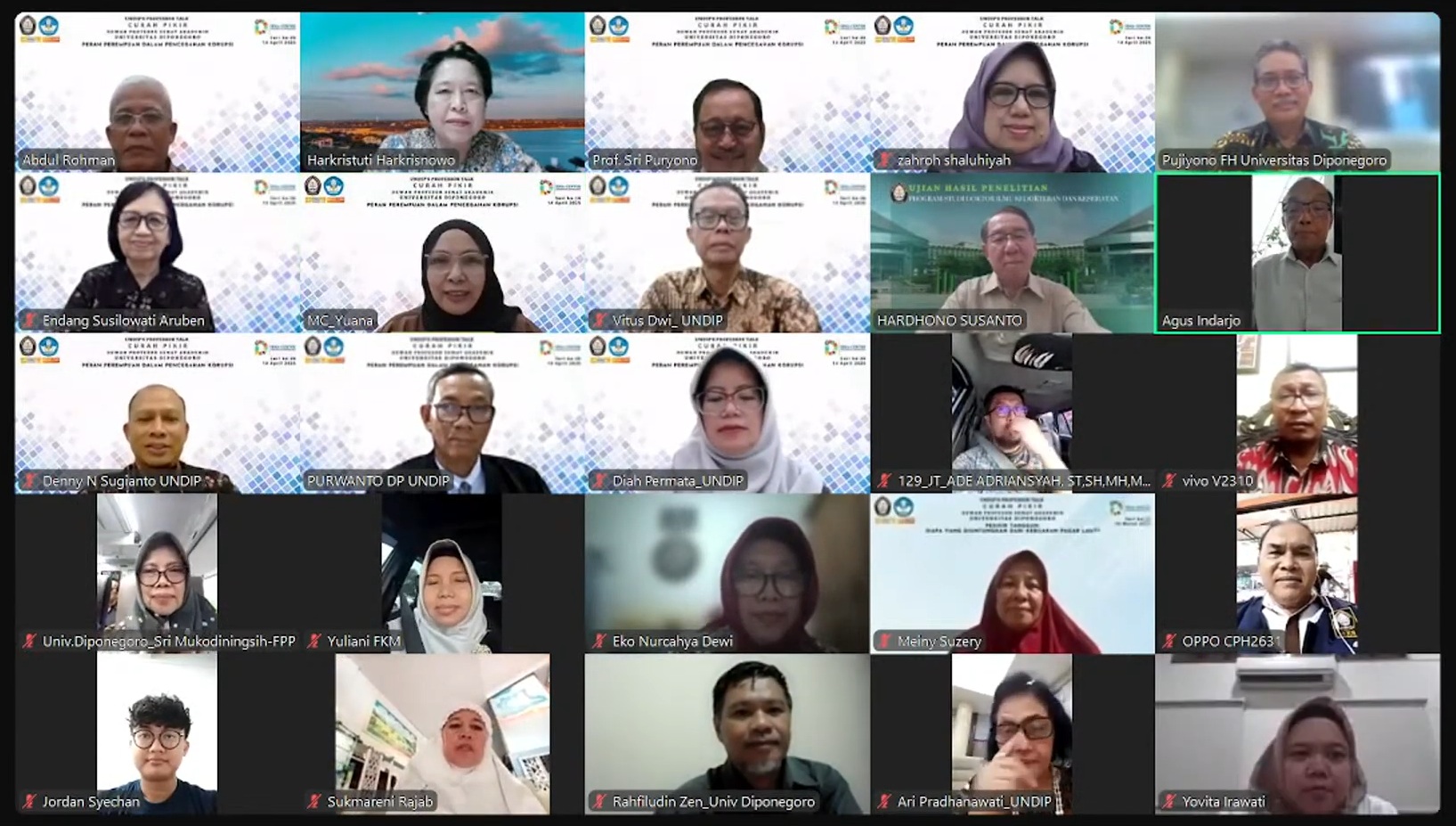UNDIP, Semarang (April 15) – Universitas Diponegoro (UNDIP) held another session of its Professor Talk series on Monday, April 14, 2025, with the theme “The Role of Women in Corruption Prevention.” The academic forum served as a platform to emphasize the contributions of women in strengthening a culture of integrity and promoting transparent, corruption-free governance.
This edition of UNDIP’s Professor Talk webinar, moderated by Prof. drg. Zahroh Shaluhiyah, MPH., Ph.D., featured four distinguished speakers:
- Harkristuti Harkrisnowo, S.H., M.H., Ph.D. (Chair of the Academic Senate, Universitas Indonesia)
- Dr. Ir. Diah Permata Wijayanti, M.Sc. (Professor at the Faculty of Fisheries and Marine Science, UNDIP)
- Dr. Pujiyono, S.H., M.Hum. (Member of Commission C, UNDIP’s Board of Professors)
- Dr. Ir. Sri Puryono, K.S., M.P. (Professor at the UNDIP Graduate School)
In her opening presentation titled “Good Governance & Anti-Corruption: The Role of Women,” Prof. Harkristuti Harkrisnowo emphasized that principles of good governance—such as transparency, accountability, participation, responsiveness, and others—are fundamental pillars in combating corruption. These values require decision-makers and social actors who uphold integrity and prioritize the public interest. Women play a crucial role in advancing these principles, as various studies indicate that women tend to demonstrate stronger moral values, ethics, and integrity.
Research shows that the presence of women in government is associated with lower corruption levels. However, women are also vulnerable to becoming victims of corruption due to socio-economic and cultural inequalities. Therefore, empowering women is key to establishing fair and inclusive governance.
Prof. Diah Permata Wijayanti continued with her presentation titled “Women as Agents of Anti-Corruption Education and Integrity Culture Reinforcement.” The anti-corruption movement gained momentum following the 1998 reform era, yet significant challenges remain.
Indonesia’s anti-corruption efforts utilize various strategies to shift corrupt behavior and build integrity. Women hold a strategic role as agents of anti-corruption education and in strengthening a culture of integrity. In their roles as mothers, wives, and community members, women have great potential to instill values of honesty and virtue.
Prof. Pujiyono then presented “Integral Policies in Combating Corruption: Challenges and Barriers to Realizing Clean Governance.” He stated that corruption in Indonesia is a complex issue. Criminal law policies tend to be symptomatic and limited in their impact. Therefore, an integrated approach is needed to build a clean and integrity-driven government.
An integral anti-corruption strategy involves reforms across various sectors, including legal, social, economic, political, cultural, public administration, management, and institutional systems, as well as international cooperation. At the 14th International Anti-Corruption Conference (IACC), themed “Restoring Trust: Global Action for Transparency,” the importance of rebuilding public trust through global transparency was emphasized. Three key approaches were proposed: educational, value-based contextual legal, and technological. These approaches are mutually supportive of building an anti-corruption culture and trustworthy governance system.
Lastly, Prof. Sri Puryono delivered his presentation titled “Strengthening Good Governance as a Strategy for Corruption Prevention in Indonesia.” He explained that various corruption theories identify a combination of greed, need, opportunity, and weak oversight as driving factors. Therefore, transparent and integrity-based governance, rooted in the principles of good governance, is essential. Anti-corruption values such as honesty, independence, responsibility, courage, simplicity, empathy, discipline, fairness, and diligence must be instilled at all levels of government and society.
According to Prof. Sri Puryono, strategic solutions for the government include strengthening superstructures, enhancing transparent and fair governance systems, developing effective anti-corruption mechanisms, improving coordination among law enforcement agencies, and enforcing strict legal action against corrupt individuals.
Corruption control should begin at the individual, family, and workplace levels, supported by committed, ethical, and integrity-driven leaders. The government is also encouraged to expand the scope of corruption prevention within Presidential Regulation No. 54 of 2018 by including a focus on anti-corruption education, mental revolution development, and anti-corruption campaigns.
